I have a very simple Maven project that I updated here, I obtained it simplifying my real project: GitHub repository
I need to run Surefire plugin to compile tests, so they can be used by Jacoco. I tried sooo many things, even changing/reducing the dependencies, but none worked! I excluded the tests in maven-compiler-plugin because it said "package main.it.isp.utility does not exist". I don't know if excluding it is correct, though....
This is my pom.xml and project structure:
<?xml version="1.0" encoding="UTF-8"?> <project xmlns="http://maven.apache.org/POM/4.0.0"xmlns:xsi="http://www.w3.org/2001/XMLSchema-instance"
xsi:schemaLocation="http://maven.apache.org/POM/4.0.0 http://maven.apache.org/xsd/maven-4.0.0.xsd">
<modelVersion>4.0.0</modelVersion>
<groupId>it.isp.batch</groupId>
<artifactId>Estrazioni-Batch</artifactId>
<version>1.0.0-SNAPSHOT</version>
<properties>
<!-- Dependency versions -->
<junit.jupiter.version>5.5.2</junit.jupiter.version>
<!-- Java 8 -->
<maven.compiler.target>1.8</maven.compiler.target>
<maven.compiler.source>1.8</maven.compiler.source>
<java.version>1.8</java.version>
<!-- Encoding -->
<project.build.sourceEncoding>UTF-8</project.build.sourceEncoding>
<project.reporting.outputEncoding>UTF-8</project.reporting.outputEncoding>
</properties>
<dependencies>
<dependency>
<groupId>org.apache.logging.log4j</groupId>
<artifactId>log4j-core</artifactId>
<version>2.17.2</version>
</dependency>
<dependency>
<groupId>org.junit</groupId>
<artifactId>junit5-engine</artifactId>
<version>5.0.0-ALPHA</version>
</dependency>
<!-- Jupiter API for writing tests -->
<dependency>
<groupId>org.junit.jupiter</groupId>
<artifactId>junit-jupiter-api</artifactId>
<version>5.8.2</version>
</dependency>
<dependency>
<groupId>org.junit.platform</groupId>
<artifactId>junit-platform-runner</artifactId>
<version>1.8.2</version>
</dependency>
<!-- https://mvnrepository.com/artifact/org.mockito/mockito-junit-jupiter -->
<dependency>
<groupId>org.mockito</groupId>
<artifactId>mockito-junit-jupiter</artifactId>
<version>4.4.0</version>
</dependency>
<dependency>
<groupId>org.springframework</groupId>
<artifactId>spring-core</artifactId>
<version>5.3.18</version>
</dependency>
<!-- https://mvnrepository.com/artifact/org.springframework/spring-tx -->
<dependency>
<groupId>org.springframework</groupId>
<artifactId>spring-tx</artifactId>
<version>5.3.18</version>
</dependency>
<!-- https://mvnrepository.com/artifact/org.mockito/mockito-core -->
<dependency>
<groupId>org.mockito</groupId>
<artifactId>mockito-core</artifactId>
<version>4.4.0</version>
</dependency>
<dependency>
<groupId>org.springframework</groupId>
<artifactId>spring-jdbc</artifactId>
<version>3.2.1.RELEASE</version>
</dependency>
<!-- https://mvnrepository.com/artifact/org.apache.commons/commons-dbcp2 -->
<dependency>
<groupId>org.apache.commons</groupId>
<artifactId>commons-dbcp2</artifactId>
<version>2.9.0</version>
</dependency>
<!-- https://mvnrepository.com/artifact/org.apache.commons/commons-lang3 -->
<dependency>
<groupId>org.apache.commons</groupId>
<artifactId>commons-lang3</artifactId>
<version>3.12.0</version>
</dependency>
<!-- https://mvnrepository.com/artifact/commons-lang/commons-lang -->
<dependency>
<groupId>commons-lang</groupId>
<artifactId>commons-lang</artifactId>
<version>2.6</version>
</dependency>
</dependencies>
<build>
<finalName>Estrazioni-Batch</finalName>
<sourceDirectory>src</sourceDirectory>
<testSourceDirectory>test</testSourceDirectory>
<resources>
<resource>
<directory>src/</directory>
<excludes>
<exclude>test/</exclude>
</excludes>
</resource>
</resources>
<plugins>
<plugin>
<groupId>org.apache.maven.plugins</groupId>
<artifactId>maven-compiler-plugin</artifactId>
<version>3.10.1</version>
<configuration>
<source>1.8</source>
<target>1.8</target>
<outputDirectory>${basedir}/target/diraliases/BATCHROOT/Estrazioni-batch/classes</outputDirectory>
<testExcludes>
<testExclude>**/*Test*</testExclude>
</testExcludes>
</configuration>
</plugin>
<plugin>
<groupId>org.apache.maven.plugins</groupId>
<artifactId>maven-surefire-plugin</artifactId>
<version>3.0.0-M6</version>
<configuration>
<testFailureIgnore>false</testFailureIgnore>
<skip>false</skip> <!-- Please take care of these parameters. They will help you to spot failure
in test assertions -->
<skipTests>false</skipTests>
<testSourceDirectory>${basedir}/src/main/test/</testSourceDirectory>
<properties>
<property>
<name>surefire.testng.verbose</name>
<value>10</value>
</property>
</properties>
<includes>
<include>**/*Test.java</include>
</includes>
</configuration>
<dependencies>
<dependency>
<groupId>org.junit.platform</groupId>
<artifactId>junit-platform-surefire-provider</artifactId>
<version>1.2.0-M1</version>
</dependency>
<dependency>
<groupId>org.junit.jupiter</groupId>
<artifactId>junit-jupiter-engine</artifactId>
<version>5.8.2</version>
</dependency>
<!-- https://mvnrepository.com/artifact/org.apache.maven.surefire/surefire-api -->
<dependency>
<groupId>org.apache.maven.surefire</groupId>
<artifactId>surefire-api</artifactId>
<version>3.0.0-M6</version>
</dependency>
</dependencies>
</plugin>
<plugin>
<groupId>org.jacoco</groupId>
<artifactId>jacoco-maven-plugin</artifactId>
<version>0.8.7</version>
<!-- Suggested to always use the latest, at minimun 0.8.3 -->
<executions>
<execution>
<id>prepare-agent</id>
<goals>
<goal>prepare-agent</goal>
</goals>
<configuration>
<!-- EXEC format is still used as an intermediate report format, but
it purpose is only internal to JaCoCo execution -->
<!-- It will not be parsed by Sonar. There will be one EXEC file for
each module of the application -->
<destFile>./jacoco-${project.artifactId}.exec</destFile>
</configuration>
</execution>
<execution>
<id>report</id>
<goals>
<goal>report</goal>
</goals>
<configuration>
<!-- The purpose of REPORT goal is to convert each EXEC in evry output
format that JaCoCo is able to produce, including XML -->
<!-- The XML files are placed inside a temporary directory -->
<dataFile>./jacoco-${project.artifactId}.exec</dataFile>
<outputDirectory>./sonar-report/temp-jacoco-xml/${project.artifactId}</outputDirectory>
</configuration>
</execution>
</executions>
</plugin>
<plugin>
<groupId>com.coderplus.maven.plugins</groupId>
<artifactId>copy-rename-maven-plugin</artifactId>
<version>1.0</version>
<executions>
<execution>
<id>copy-file</id>
<phase>verify</phase>
<goals>
<goal>copy</goal>
</goals>
<configuration>
<!-- The purpose of this plugin is to collect all the XML files under
the temp directory in each module -->
<!-- and copy in to the right path scanned by Sonar. There will be
one XML file for each module -->
<sourceFile>./sonar-report/temp-jacoco-xml/${project.artifactId}/jacoco.xml</sourceFile>
<destinationFile>./sonar-report/jacoco-xml/jacoco-${project.artifactId}.xml</destinationFile>
</configuration>
</execution>
</executions>
</plugin>
</plugins>
</build>
